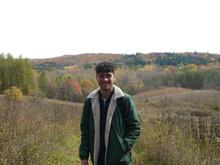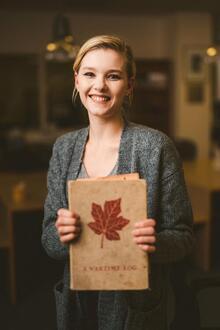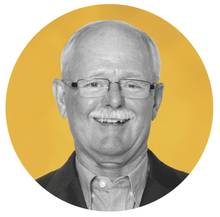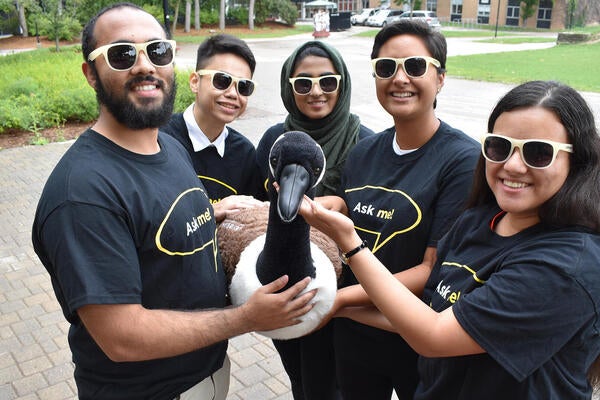
Donors open doors
Meet students who discovered new opportunities and two alumni who are making a difference

Meet students who discovered new opportunities and two alumni who are making a difference
By Abigail Ollila Current studentFor almost two years, university students have faced an uphill battle. The COVID-19 pandemic has impacted everything from learning formats to job opportunities and research accessibility. Few elements of the higher education experience currently resemble our pre-2020 expectations. In light of these financial and educational challenges, donors to the University of Waterloo are reaching out to uplift students. Read on to see their impact.
 Donors are enabling young professionals and researchers to keep moving forward. When Environment, Resources and Sustainability (ERS) student Ethan Leiher began his first co-op job search, his heart was set on working for rare, a non-profit urban land trust and environmental institute. Due to a funding gap, this dream was almost out of sight for Ethan. Thankfully, the Faculty of Environment stepped in to connect him with a Global Citizen Internship – an opportunity powered by Waterloo’s co-op program, alumni, corporate partners, faculty and staff. We asked Ethan what he would tell the donors who make internships like his a reality. “This was an amazing job that I'm very grateful to have had,” he said, “thank you for giving me that opportunity.”
Donors are enabling young professionals and researchers to keep moving forward. When Environment, Resources and Sustainability (ERS) student Ethan Leiher began his first co-op job search, his heart was set on working for rare, a non-profit urban land trust and environmental institute. Due to a funding gap, this dream was almost out of sight for Ethan. Thankfully, the Faculty of Environment stepped in to connect him with a Global Citizen Internship – an opportunity powered by Waterloo’s co-op program, alumni, corporate partners, faculty and staff. We asked Ethan what he would tell the donors who make internships like his a reality. “This was an amazing job that I'm very grateful to have had,” he said, “thank you for giving me that opportunity.”
 Over at the Dana Porter Library, a unique donation set History student Anna Good on a research journey that she will never forget. Cameron Hill was a pilot and prisoner of war (POW) during the Second World War, and in 2019, his family decided to share his story with the world. They chose the Special Collections & Archives (SCA) to house his “war box” – a collection of artifacts, photographs and diaries from his time overseas. Anna was moved by the resilience that she discovered throughout these pages. “Working so closely with the diary made me realize how many voices from war are not heard,” she said, “I’m so grateful that Cameron Hill’s family donated the collection and I’m honoured to have experienced it.”
Over at the Dana Porter Library, a unique donation set History student Anna Good on a research journey that she will never forget. Cameron Hill was a pilot and prisoner of war (POW) during the Second World War, and in 2019, his family decided to share his story with the world. They chose the Special Collections & Archives (SCA) to house his “war box” – a collection of artifacts, photographs and diaries from his time overseas. Anna was moved by the resilience that she discovered throughout these pages. “Working so closely with the diary made me realize how many voices from war are not heard,” she said, “I’m so grateful that Cameron Hill’s family donated the collection and I’m honoured to have experienced it.”
 Donors are also helping students to become financially secure during the economic instability of the pandemic. With a Waterloo Philosophy degree and and MBA under his belt, Bob Ewen (BA ’71) built a successful career in the Canadian securities industry. Looking back, he reflected on the financial stress of university. “Money was always a problem,” he explained, “Many peers worked part-time to make ends meet.”
Donors are also helping students to become financially secure during the economic instability of the pandemic. With a Waterloo Philosophy degree and and MBA under his belt, Bob Ewen (BA ’71) built a successful career in the Canadian securities industry. Looking back, he reflected on the financial stress of university. “Money was always a problem,” he explained, “Many peers worked part-time to make ends meet.”
Bob wanted to give back to the Philosophy department in order to relieve some of those financial burdens. Clair Baleshta (BKI ’20), one of the recipients of his gift, believes that alumni like Bob make it possible for students to pursue their passions. “I wouldn’t be on the path to becoming a bioethicist without their generosity,” she said. “For so many students, financial awards make all the difference.”
 When Jothi Bavan (BASc ‘03) was 17, the generosity of family and colleagues allowed her to escape civil war in Sri Lanka and eventually study chemical engineering at the University of Waterloo. Now senior manager at Ontario Power Generation, Darlington Nuclear Generating Station, she felt the desire to give back. The Kanagampikai Suntharampillai bursary, named in honour of Jothi’s late mother, will empower the next generations of female chemical engineers through the pandemic and beyond.
When Jothi Bavan (BASc ‘03) was 17, the generosity of family and colleagues allowed her to escape civil war in Sri Lanka and eventually study chemical engineering at the University of Waterloo. Now senior manager at Ontario Power Generation, Darlington Nuclear Generating Station, she felt the desire to give back. The Kanagampikai Suntharampillai bursary, named in honour of Jothi’s late mother, will empower the next generations of female chemical engineers through the pandemic and beyond.
“I personally benefited due to the generosity of others in my first year of engineering and I simply want to pass on the gesture,” she said. “Financial burden should never be a hindrance to a woman in achieving her dreams.”

Read more
Staff member Rubin Kataki (BA '17) shares his very special reason for giving to Waterloo

Read more
Generous donors help ambassadors support their fellow students while building skills for the future

Read more
Lee Anne Doyle (BES ’81) shares why she volunteers in the UWaterloo community, and what she hopes to achieve
The University of Waterloo acknowledges that much of our work takes place on the traditional territory of the Neutral, Anishinaabeg, and Haudenosaunee peoples. Our main campus is situated on the Haldimand Tract, the land granted to the Six Nations that includes six miles on each side of the Grand River. Our active work toward reconciliation takes place across our campuses through research, learning, teaching, and community building, and is co-ordinated within the Office of Indigenous Relations.